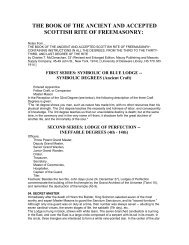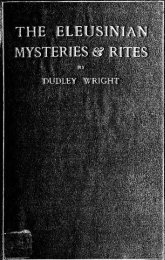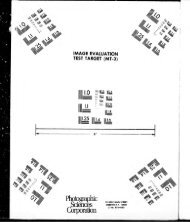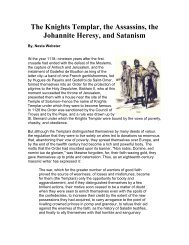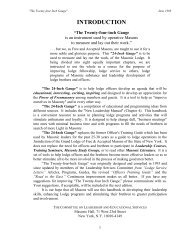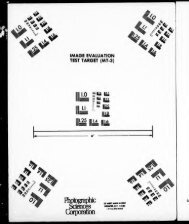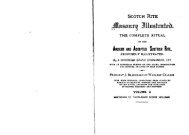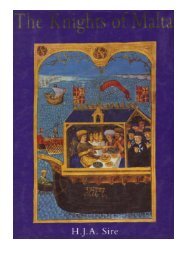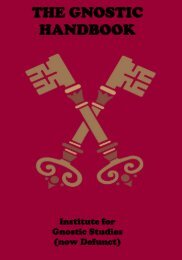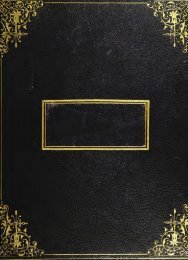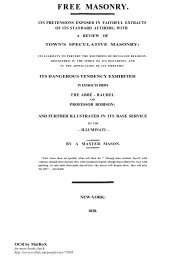The History of Initiation - The Masonic Trowel
The History of Initiation - The Masonic Trowel
The History of Initiation - The Masonic Trowel
Create successful ePaper yourself
Turn your PDF publications into a flip-book with our unique Google optimized e-Paper software.
12 HISTORY OF INITIATION.<br />
persons who were incarcerated with him, he emerged<br />
into the light and hope <strong>of</strong> a new and perfect world on<br />
which the favour <strong>of</strong> heaven once more smiled, as it did<br />
on the first created man in the garden <strong>of</strong> Eden. <strong>The</strong><br />
candidate, at his initiation, was a representative <strong>of</strong> the<br />
patriarch during his erratic voyage and subsequent delivery<br />
from destruction.31 Like Noah, he beheld, in a<br />
figurative manner, the uncontrolled licence <strong>of</strong> the iron<br />
age, 32 the anarchy and contentions <strong>of</strong> the impious race<br />
before the Flood, under the sway <strong>of</strong> their prince Ophion, 33<br />
like Noah, he descended into Hades or the Ark, a place<br />
was in the Mysteries, to have been accomplished by fire and water;<br />
and it is remarkable that all the heathen accounts <strong>of</strong> the Deluge<br />
ascribe that event to the agency <strong>of</strong> fire. (Ovid. Metam., 1. i.) And<br />
the account in Hesiod's <strong>The</strong>ogony <strong>of</strong> the destruction <strong>of</strong> the Titans,<br />
who were no other than the impious antediluvians, is replete with<br />
the same terrific machinery ; thunder, lightning, fire, and water. In<br />
the highly figurative account <strong>of</strong> the Deluge exhibited in the Courma<br />
Avater <strong>of</strong> the Hindoos, the mountain Mandar, which represents the<br />
earth, is said to be involved in raging flames which spread destruction<br />
on every side. (Bhagvat Geeta, p. 148.) It was, indeed, a common<br />
belief amongst all nations that the Deluge was accompanied by<br />
** a torrent <strong>of</strong> fire. Pionus, who suffered martyrdom in the year 250,<br />
under the Emperor Decius, among other things, spake thus to his<br />
unbelieving persecutors: 'Ye yourselves, from your old traditions,<br />
acknowledge that the Deluge <strong>of</strong> Noah, whom you call Deucalion,<br />
was mingled with fire, yet do you but half understand the real truth<br />
<strong>of</strong> this matter.' " (Pontoppidon. Hist. Norway, p. 52.) Sale, from<br />
Al Beidawi says, that the waters <strong>of</strong> the Deluge were reputed to have<br />
burst from a hot-oven at Cufa; (Koran, Edit. 1825, vol. ii., p. 44, in<br />
nota. b.) and the Parsees similarly fabled that the waters proceeded<br />
from the hot-oven <strong>of</strong> an old woman named Zala. On this curious<br />
subject the authorities are numerous and convincing. <strong>The</strong> intelligent<br />
reader may pr<strong>of</strong>itably consult Hyde de Rel. vet. Pers., c. 10. Vid.<br />
etiam Plat. Tim., p. 22. Plin. Nat. Hist., 1. ii., c. 25. Cedren. Hist.<br />
Comp., p. 10. Strabo. Geogr., p. 197. Cudw. Int. Syst., p. 328.<br />
Wilkins. Bhagvat. Geeta, p. 147. Fab. Pag. Idol., vol. ii., b. iii., c.<br />
4. Myst. Cab., vol. i., p. 82. Dav. Celt. Kes., p.<br />
157. Maur. Ind.<br />
Ant., vol. ii., p. 344. Edda Snor., Fab. 32. Mai. North. Ant., vol. ii.<br />
31 <strong>The</strong> Mysteries, in all their forms, were funereal. <strong>The</strong>y celebrated<br />
the mystical death and revivification <strong>of</strong> some individual, by the<br />
use <strong>of</strong> emblems at once impious and disgusting. David accuses the<br />
Israelites <strong>of</strong> this abominable practice in Psalm cvi. (v. 28, 29.) " <strong>The</strong>y<br />
joined themselves to Baal Peor, (Dionusus, Orph., Hymn 5.) and ate<br />
the sacrifices <strong>of</strong> the dead. Thus they provoked Him to auger with<br />
their inventions."<br />
2<br />
Vid. Ovid. Metam., 1. i.<br />
33<br />
Apollon. Argon., 1. i. Ophion was no other than the infernal<br />
Serpent, the equal foe <strong>of</strong> God and man.



